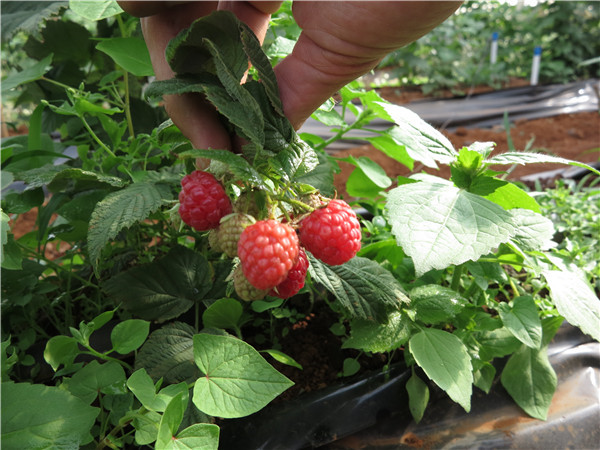 |
|
Raspberries from Martin's farm, which harvested 40 tons of berries and sold 38 tons last year. [Photos By Chen Liang/China Daily] |
In 2007, he declined an offer by his company to transfer him to France, and instead, together with his father, started looking for a suitable location for his raspberry farm, focusing on Sichuan, Yunnan, and the Xinjiang Uygur autonomous region.
"To grow raspberries requires moderate temperatures, moisture, and a lot of sunshine," he says. "Sunshine is a problem in Sichuan, while Xinjiang's winter is too long, and the place is too far away from any major cities, which is a problem for distribution. We decided to go to Yunnan."
Dabilly first noticed the flat fields of Yunnan's Songming county while traveling on an expressway toward Kunming, and in 2008 he paid 10,500 yuan ($1,710; 1,528 euros) a hectare per year to rent the land for his farm in Longyuan. Last year, the rent increased to 37,500 yuan a hectare.
"The weather and distance (to major cities) are both good for running a farm," he says. "Many people have come here to grow vegetables."
The harvest for raspberries is from May to October, and Dabilly says Meiming yielded 40 metric tons of the fruit last year, of which they sold 38 tons.
The French farmer says the biggest challenges to his business have been marketing - "few Chinese know what a raspberry actually is" - and finding trustworthy supermarkets, distributors and hotels to work with.
At the beginning, Meiming signed sales agreements with several large supermarkets in Beijing and Shanghai, but Dabilly called that a big mistake.
"According to our contract, we should have received payment within two weeks, but it turned out to be closer to six months," he says.
Today, the farm deals mainly with wholesale distributors and some five-star hotels and restaurants. Dabilly says foreign executive chefs at several top hotels in Shanghai have become regular customers.
|
|
|
|
|
|
|
|
